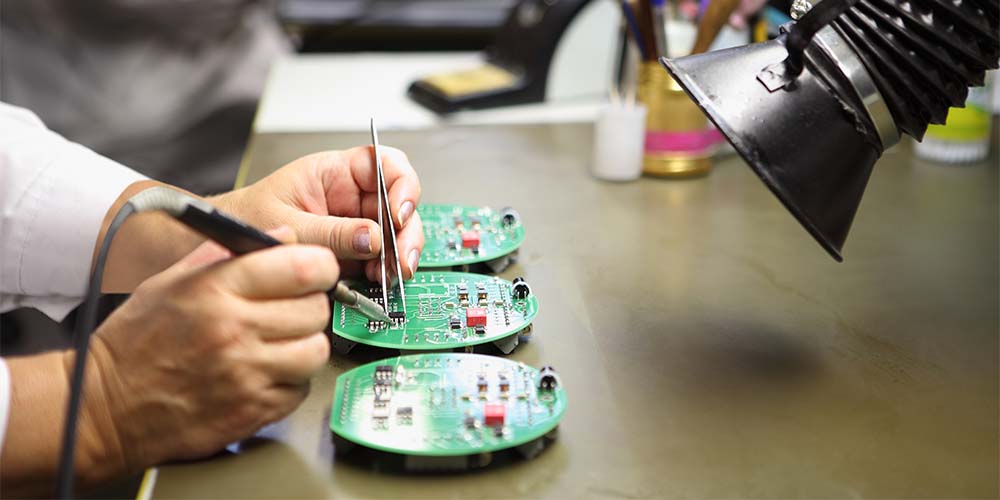India’s Electronics Sector to Create 12 Million Jobs by 2027, Aiming for $500 Billion Output

30 December 2024: India’s electronic sector in India is undergoing a transformative phase, with an ambitious goal of achieving $500 billion in manufacturing output by 2030. To meet this target, the electronic sector in India must grow fivefold over the next five years, bridging a $400 billion production gap. Currently, domestic production stands at $101 billion, with mobile phones contributing 43%, followed by consumer and industrial electronics at 12% each, and electronic components at 11%. Additionally, emerging segments like auto electronics (8%), LED lighting (3%), wearables and hearables (1%), and PCBAs (1%) offer substantial growth potential, making the electronic sector in India a key driver of future economic growth.
According to TeamLease Degree Apprenticeship’s latest electronics report, the electronics sector is poised for significant expansion, projected to create 12 million jobs by 2027—3 million direct and 9 million indirect roles. Direct employment opportunities will include nearly 1 million engineers, 2 million ITI-certified professionals, and 0.2 million specialists in fields like AI, ML, and data science, while non-technical roles are expected to contribute 9 million indirect jobs. These trends underscore the sector’s capacity to fuel economic growth and provide diverse career opportunities.
While the outlook appears promising, India’s electronics sector faces a significant talent deficit that could impede its progress. This gap is not just a numerical challenge but is deeply tied to a shortage of skilled talent, threatening the country’s ability to achieve its ambitious manufacturing goals. Workforce skills must align with industry needs, particularly for high-demand components like semiconductors, electromechanical parts, and passive/active components.
To address these challenges, targeted efforts are required to build a skilled, future-ready workforce. A.R. Ramesh, CEO of TeamLease Degree Apprenticeship, shared, “Achieving the ambitious goal of $500 billion in manufacturing output by FY 2030 demands a more assertive approach to addressing critical skill gaps. Apprenticeships and internships play a transformative role in bridging this gap by providing hands-on training directly aligned with evolving industry demands, ensuring graduates are not only employable but industry-ready. Scaling apprenticeship enrollments, projected to grow from 1 million to 2 million apprentices by 2027, will help create a robust talent pipeline to meet industry needs.”
Sumit Kumar, Chief Strategy Officer at TeamLease Degree Apprenticeship, added, “India’s electronics sector, valued at $101 billion, is swiftly positioning itself as a global electronics hub, contributing 3.3% to global manufacturing and 5.3% to India’s total merchandise exports in FY23. Despite its modest 4% participation in global value chains, the sector holds immense growth potential by moving beyond final assembly to include design and component manufacturing. As opportunities and employment creation rise, a multi-pronged approach becomes essential, with a strong focus on apprenticeships, reskilling, and upskilling to cultivate a future-ready workforce. Apprenticeships are crucial in building a talent pipeline by combining theoretical knowledge with hands-on experience, ensuring that the workforce is equipped with industry-relevant skills. Furthermore, capacity building is vital, especially given that ITIs currently operate at just 51% enrollment. Employers and industries can strengthen this effort by setting up in-house training centers and collaborating with academia through Work-Integrated Learning Programs (WILP) and degree apprenticeships. Scaling apprenticeship programs, reskilling, and upskilling initiatives for over 50% of the workforce, alongside robust capacity-building measures, will empower India to bridge the skills gap and drive sustainable growth, solidifying its position as a global leader in electronics.”
About TeamLease Degree Apprenticeship:
TeamLease Degree Apprenticeship is India’s largest Degree Apprenticeship service provider offered through a partnership with 22 universities pan-India, including TeamLease Skills University (TLSU) and an empanelled third-party Aggregator under the guidelines laid down by the Ministry of Education & Ministry of Skill Development and Entrepreneurship. The company acts as a key facilitator between industry, academia, youth, government & industry bodies for the penetration of and improving the effectiveness of work-based learning programs, including apprenticeships, across India. The company has hired about 1 million apprentices with more than 1000 employers in the past 10 years. About 98% of these apprentices have transitioned into formal employment, and almost 40% have been employed in the same organization. Through its Degree Apprenticeship Program, TeamLease focuses on enhancing the employability quotient of the youth of our country and bridging the skill deficit.
Latest Press Releases
Paradox in PM-VBRY Awareness, Large Firms Lead While Startups Lag
While 81% of employers report some awareness of the Pradhan Mantri Viksit Bharat Rozgar Yojana (PM-VBRY) scheme, it is largely concentrated among large organisations at...
Read MoreIncome disparity, tough work conditions plague gig work in india
This is primarily driven by the flexible nature of gig work, income volatility, seasonal demand shifts, and workers moving between platforms in search of better...
Read MoreWeak Consumption, Not Tariffs, Was the Bigger Drag on Jobs
If there has been any softness in hiring or workforce trends last year, it is far more a reflection of weak domestic consumption than the...
Read MoreCentre unveils new labour codes, overhauls workforce practices, benefits
The Centre on Friday rolled out four new labour codes 2025 that extend basic social security and minimum wage guarantees to over 400 million workers...
Read MoreAI, data engineers to see 10-12% salary growth in 2026
Amid the AI boom, professionals with AI-first capabilities, data engineers and cybersecurity specialists will be in demand and witness 10-12% salary growth in 2026. With...
Read More



